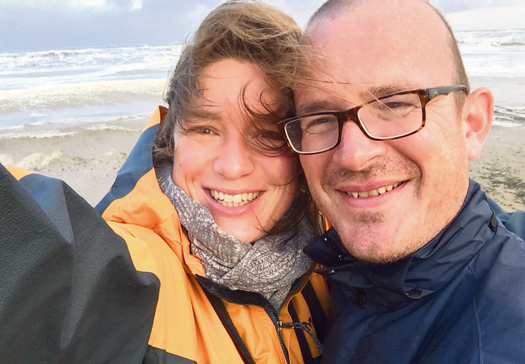‘Lessons aren’t being learned,’ says widow of scientist who was stabbed to death by student suffering psychotic illness
Monday, 23rd January 2017 — By Koos Couvée

Nadja Ensink-Teich with husband Jeroen
THE widow of a scientist killed by a psychotic man who had been released by prosecutors days earlier has accused the authorities of failing to learn the lessons of the case.
Dr Jeroen Ensink, 41, was stabbed to death in a brutal and random attack outside his Tufnell Park home on December 29, 2015, by a student suffering from paranoid schizophrenia. Dr Ensink had gone out to post cards to inform friends and family of the birth of his daughter, Fleur, who was born 11 days earlier.
His widow, Nadja Ensink-Teich, called for an independent investigation after it emerged that charges for assault of a police officer and knife possession against killer Femi Nandap were dropped six days before he killed her husband. But a year on from the Dutch biologist’s death there has been no investigation into why information about Nandap’s mental state and the danger he posed was not passed on.
“It feels like no one is ever responsible for anything,” Ms Ensink-Teich, 37, said. “It always feels like I’m 20 steps ahead of them. They agree it was a mistake, but what happens now? I don’t think they want to learn the lessons.
“I just want the people responsible for this to be held accountable, and changes need to happen. It won’t bring back Jeroen, but if I can do anything to prevent this from happening to any other family, then I will have achieved a lot.”
Nandap, 23, had been arrested seven months earlier for possessing a knife and assaulting a police officer during a psychotic episode in Belsize Park. But the charges were dropped after the Crown Prosecution Service (CPS) decided there was insufficient evidence. Questions remain around how Nandap was allowed to travel to his native Nigeria, where he had a stint in a hospital and was treated for irrational talk and hallucinations, while out on bail.
Police were later provided with medical records but, according to Ms Ensink-Teich, these were not passed on to the CPS. It was later revealed that Nandap had responded well to anti-psychotic medication but had stopped taking it when he returned to Britain in October 2015. Despite this, he was granted bail. Speaking to the Tribune from her home in The Netherlands,
Ms Ensink-Teich added: “The police and the CPS really didn’t work together. They dropped the charges without taking the medical report into consideration. When they looked at the case again, they said it should have been done.
“There’s a failing in the system. Society has a duty of care for people who need help, and at the same time it has a duty to protect the general public from him.”
A three-day inquest at St Pancras Coroner’s Court has been scheduled for April 25 after coroner Mary Hassell approached Ms Ensink-Teich over whether she wanted to go through the process. But just months before the inquest is due to start, she is unable to afford a lawyer and is unsure whether, as an EU citizen, she can access legal aid.
However, when told of her situation, Finsbury Park-based charity INQUEST, which supports people bereaved by deaths in custody and detention, vowed to support Ms Ensink-Teich.
INQUEST director Deborah Coles said: “This is a serious case and there are questions that need to be asked about cross-agency communication. And there must be a wide-ranging inquest for the family to find out the truth and to ensure that any learning from this case is acted upon.”
Dr Ensink was a popular researcher and senior lecturer in public health engineering at the London School of Hygiene and Tropical Medicine. He devoted his professional life to improving access to water and sanitation in developing countries. Nandap was given an indefinite hospital order after pleading guilty to manslaughter on the grounds of suffering a mental abnormality.
Meanwhile, Ms Ensink-Teich carries on a lonely fight for answers, impeded by the fact that she has moved back to her native Holland to be closer to her family.
“December was such a difficult month. I’m just trying to keep my head above water,” she said, adding: “Fleur makes it possible for me to go on. She’s such a wonderful, special girl, she smiles all day. And she’s the spitting image of Jeroen.”
The CPS say they have reviewed the decision to drop charges and concluded that it was wrong. But they have not indicated they will investigate the matter further. They added that because Nandap had been granted bail at Highbury Corner Magistrates’ Court on October 12, 2015, even if the charges had not been dropped he would not have been prevented by his bail conditions from being where he killed Dr Ensink.
A CPS spokesman said: “This was a tragic case and our heartfelt sympathies remain with Mr Ensink’s family. We remain in ongoing contact with Mrs Ensink-Teich and have offered a further meeting to offer additional clarification and support.”